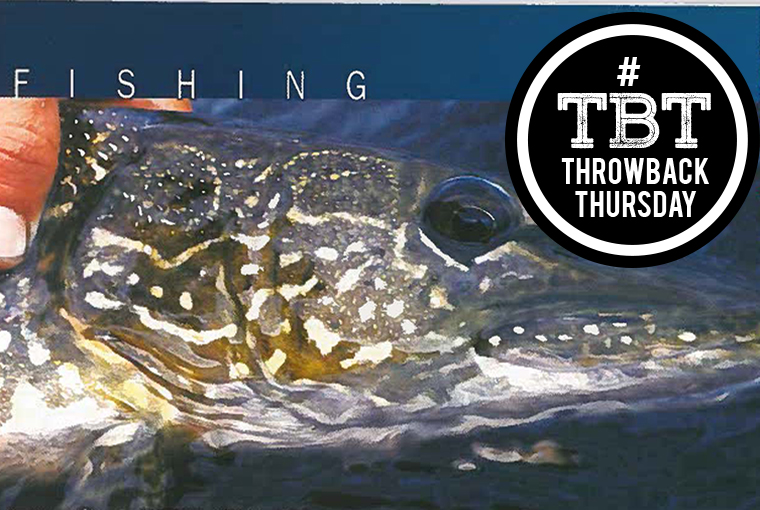
A number of years in the past I did a radio interview with a morning present host I’d by no means spoken with earlier than. The topic was to be youngsters and fishing and the promotion of Nationwide Fishing Week. The host, a girl from Toronto who appeared not particularly thrilled with the subject, determined to sandbag yours really stay on air.
“How do you condone instructing youngsters to harm fish?” she mentioned, after I mentioned why I take my youngsters fishing. The query wasn’t on the script. I defined fish differ from people and, if dealt with appropriately, can get well rapidly from being caught and launched.
Not a nasty reply, I believed.
“Are you saying these fish should not feeling ache whenever you catch them?” she shot again.
I needed to admit I didn’t know for positive, however was assured the expertise was completely different from what people felt. Looking back, my reply was presumptuous and possibly sounded a bit of hole. To be trustworthy, fish ache was one thing I’d not thought of a lot. Since then I’ve spent a good bit of time eager about it and my accountability as an angler.
Do fish really feel ache once we catch them?
Do fish really feel ache once we catch them? And in the event that they do, what attainable motive might there be to proceed angling – and particularly releasing – fish for pleasure?
The subject made information across the globe this yr and was seized upon by a number of animal-rights teams. They are saying hooking a fish is identical as hooking a mammal or human. They consider, as Lord Byron as soon as wrote, that angling is “the cruelest, the coldest, and the stupidest of pretended sports activities.”
In England a number of circumstances of terrorism have been aimed on the angling neighborhood. In america protests have been much less violent, however a number of bass tournaments have been the scenes of small, however noisy, anti-angling occasions.
For an actual eye-opener try the Folks for Moral Therapy of Animals (PETA) anti-fishing Site, www.fishinghurts.com. It says angling hurts fish, and individuals who do it are misinformed, at greatest, barbaric at worst. It desires everybody to cease consuming fish and develop into vegetarians.
For probably the most half, PETA’s arguments are based mostly on emotion. The group’s most direct proof of fish feeling ache comes from a 1979 paper sponsored by the Royal Society for the Prevention of Cruelty to Animals, which reached this conclusion:
“The proof suggests that each one vertebrates (together with fish), by the mediation of comparable neuoropharmacological processes, expertise comparable sensations to a better or lesser diploma in response to noxious stimuli.”
By most accounts, the examine doesn’t maintain up properly to shut scientific scrutiny.
Tutorial debates
The controversy over fish ache isn’t restricted to the perimeter of the animal-rights world. Inside the educational neighborhood, the welfare of animals and fish utilized in analysis has been hotly debated.
The latest analysis particularly on whether or not fish really feel ache was undertaken by a professor of zoology and physiology on the College of Wyoming, Dr.James Rose. He has spent 30 years researching mind perform, together with the response to ache, and has performed in depth work with fish and different animals.
The American Fisheries Society — a scientific group of biologists, scientists, fisheries managers, and fish-culture specialists — requested Rose to undertake the examine. It wished to handle the ethics and regulation of utilizing fish in analysis, particularly what the correct standards must be for guaranteeing the humane therapy of fish.
To get a complete sense of the problem, Rose and his colleagues did an enormous literature survey on all accessible analysis that dealt not solely with ache, however with the neurology of fish and different species. Rose compiled an enormous physique of knowledge by no means earlier than examined for this particular function. Rose and his colleagues discovered that quite a bit is understood in regards to the neurology of ache and what it takes to expertise it.
It’s typically agreed upon amongst scientists who examine ache that the precise expertise of ache is a psychological factor and that it’s fully separate from the behavioural reactions,” Rose mentioned.
Consciousness key to ache
“Ache is predicted on consciousness,” he continued. “The important thing subject is the excellence between nociception and ache. An individual who’s anaesthetized in an working room, or has had a nasty head harm, will reply bodily to exterior stimulation, however she or he is not going to really feel ache. Anybody who has seen a rooster with its head lower off will know that, whereas its physique can reply to stimuli, it can’t be feeling ache.
“The time period ‘nociception’ refers back to the detection of noxious stimuli by the nervous system. The peripheral nervous receptors scientists name nociceptors sense stimulation and report back to the central nervous system, the place motor responses are initiated and the feeling of ache is perceived. Some fish species definitely do have nociceptive neurones much like these present in a human. Nevertheless, this implies solely that these animals are able to sensing noxious stimuli; it offers no proof for the psychological expertise of ache.”
The Rose examine concluded the acutely aware expertise of ache or struggling is because of exercise within the cortex of the mind. That exercise is situated in a specialised type of cortex known as the neocortex, which could be very giant in people. Fish don’t possess a neocortex. They actually don’t have the mind system to really feel ache or different feelings like worry.
“There are fairly massive variations in the best way nervous programs work in numerous animals,” mentioned Rose. “The analysis exhibits that our experiences as people are actually distinctive as a species and it’s actually unsuitable to generalize that our expertise is identical as different animals.’ If we actually need to perceive the true nature of different animals, we now have to withstand taking a human-centred (anthropomorphic) perspective of them.”
Analysis rebuttal
Scientists across the globe extensively accepted this groundbreaking examine on fish ache, however, as you would possibly anticipate, there has not been common acceptance of Dr. Rose’s conclusions.
This April, simply months after Rose launched his examine outcomes, the world media reported that scientists in Scotland had confirmed that fish really do really feel ache in any case. The examine at Edinburgh College and the Roslin Institute (additionally the birthplace of Dolly the cloned sheep) was performed on captive rainbow trout. The researchers, led by Dr. Lynne Sneddon, utilized mechanical, thermal, and chemical stimuli to the heads of anaesthetized fish and recorded the neural exercise.
She reported discovering 58 receptors situated on the face and head of the trout that responded to no less than one sort of stimuli. Of those, Sneddon mentioned 22 could possibly be categorized as nociceptors, in that the fish responded to mechanical strain when heated above 104 levels Fahrenheit (40 levels celsius).
As Dr. Rose reported, the mere presence of nociception in an animal isn’t sufficient to show that it feels ache, as a result of its response could also be a reflex.
So, the Scottish researchers injected large quantities of poison (bee venom or acetic acid) into the lips of among the trout, with management teams receiving saline-solution injections or just being dealt with. All of the fish had been conditioned to feed at a hoop within the holding tank, the place they have been collected for dealing with or injection.
Their reactions have been then recorded.
Behaviours vs responses
Dr. Sneddon famous that trout subjected to bee venom and acetic acid exhibited “anomalous behaviour.” Fish demonstrated a “rocking” movement, much like the sort seen in pressured larger vertebrates, like mammals. “The trout injected with the acid have been additionally noticed to rub their lips onto the gravel of their tank and on the tank partitions,” Sneddon mentioned in an interview with the UK press.
“These don’t look like reflex responses.”
The fish injected with venom and acid additionally took virtually thrice longer to renew feeding than the management teams. Dr. Sneddon mentioned his group’s work “fulfills the factors for animal ache.”
The UK’s Nationwide Angling Alliance was fast to react to the Scottish examine. Dr. Bruno Broughton, a fish biologist and NAA advisor, mentioned, “I doubt that it’ll come as a lot o a shock to anglers to study that fish have an elaborate system of sensory cells round their mouths…Nevertheless, it’s a wholly completely different matter to attract conclusions in regards to the capability of fish to really feel ache, a psychological expertise for which they — actually — would not have the brains.”
PETA, not surprisingly, welcomed the Scottish examine, however mentioned fish shouldn’t have needed to undergo to show one thing “they really feel is apparent.”
It must be famous Dr. Rose doesn’t dispute fish have sensory cells in and across the mouth. He believes, nevertheless, the Scottish examine is critically flawed. PETA has pressured Rose to retract his findings, however he stands by his authentic outcomes.
Whereas debate is certain to rage on about fish ache, it appears clear to me that what a fish experiences when impaled on a hook can’t be in comparison with what a human will really feel. Bee-stung trout lips don’t maintain a lot weight towards the huge scientific-literature search and overview undertaken by Dr. Rose.
Drive to outlive
Do fish reply to hook? After all. The response of a trout to a fly, a walleye to a jig, or a muskie to a bucktail is what’s drawn anglers to the water since recorded time. The battle of a fish is a big a part of the joys of angling. The intuition to flee seize is hard-wired into fish. They don’t have to really feel ache to battle towards a hook and line pulling in the wrong way.
Survival, not ache, drives them.
It’s the identical flight response a fish would exhibit to a visual predator or being startled by a vibration within the water, the Rose examine identified.
Understanding fish don’t really feel ache by no means absolves anglers from appearing responsibly. Simply the alternative is true. Anglers who practise catch-and-release have to be particularly conscious how they deal with stay fish. They are often pressured physiologically when out of the water, and stress can rapidly develop into deadly.
All fish must be handled with respect when caught, whether or not they’re to be killed or launched. A fish that’s to be eaten must be dispatched humanely as quickly as attainable. We should at all times be conscious of our stewardship obligation to guard and preserve fisheries.
It comes together with the privilege of fishing.

Initially printed within the October-November 2003 subject of Ontario OUT of DOORS.
Gord Ellis is a Senior Editor, journalist, radio broadcaster, photographer, {and professional} angler based mostly in Thunder Bay.
Attain Gord at: mail@oodmag.com and @GordEllis on Twitter.
To study extra about fish and ache, click on right here
